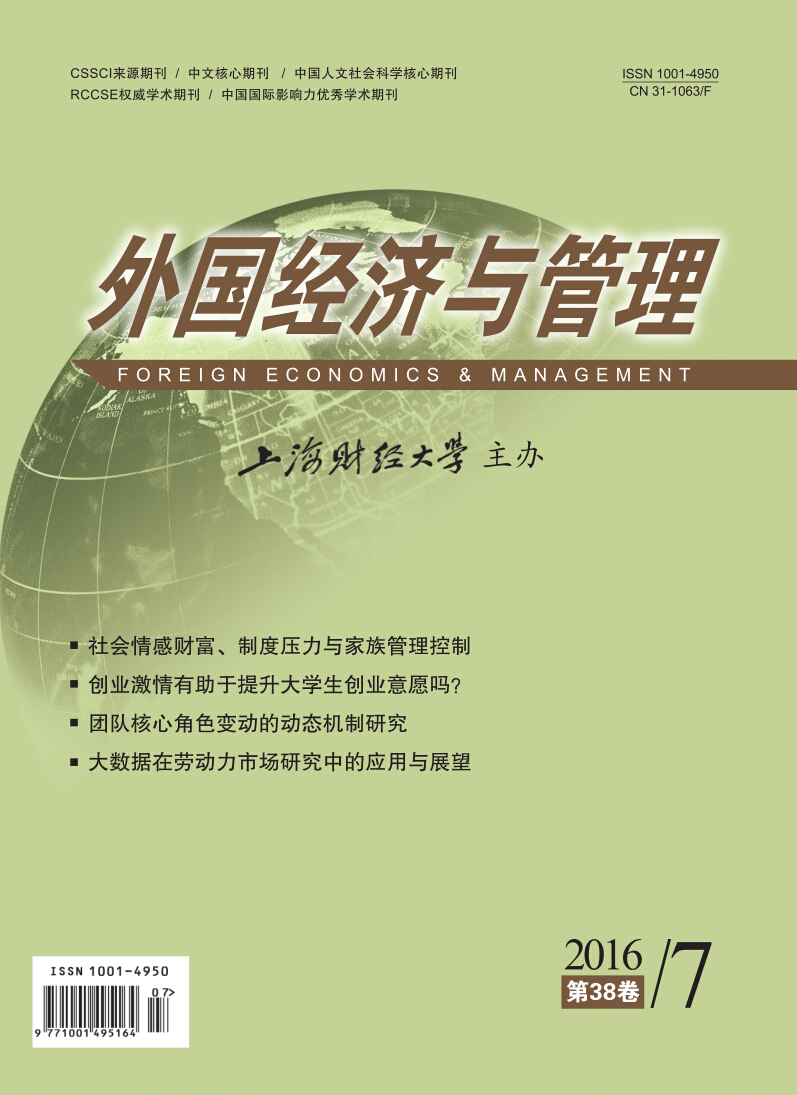组织话语研究在本质上将组织视为话语性社会构建过程,以组织情境中的口头与书面话语文本为直接研究对象,以此剖析组织行为、现象、关系、要素及组织本身,这一特殊理论框架与研究方法以社会科学中的“语言转向”为发展契机,挑战实证主义传统,重思语言与现实的关系,对组织研究具有变革性意义,被广泛运用到制度、战略、身份认同、变革等关键组织研究领域。本文在系统梳理这四个领域主要相关成果的基础上,综合述评话语分析对组织研究的主要贡献,进而提出组织及其要素的话语构建过程理论研究模型,并从语言关注程度、理论基础、研究方法、研究主题等方面指出现有研究中存在的主要问题及未来研究方向,特别就中国组织话语体系建设及研究提出基本建议,以期在向中国组织研究界推介这一研究方法和理论框架的同时,为后续相关研究,尤其是中国组织话语研究做铺垫。
组织话语研究述评及展望
摘要
参考文献
1 吕源, 彭长桂. 话语分析:开拓管理研究新视野[J]. 管理世界, 2012, (10):157-171.
2 彭长桂, 吕源. 组织正当性的话语构建:谷歌和苹果框架策略的案例分析[J]. 管理世界, 2014, (2):152-169.
3 彭长桂, 吕源. 制度如何选择:谷歌与苹果案例的话语分析[J]. 管理世界, 2016, (2):149-169.
4 Balogun J, Jacobs C, Jarzabkowski P, et al. Placing strategy discourse in context:Sociomateriality, sensemaking, and power[J]. Journal of Management Studies, 2014, 51(2):175-201.
5 Bitektine A, Haack P. The “macro” and the “micro” of legitimacy:Toward a multilevel theory of the legitimacy process[J]. Academy of Management Review, 2015, 40(1):49-75.
6 Clemente M, Roulet T J. Public opinion as a source of deinstitutionalization:A “spiral of silence” approach[J]. Academy of Management Review, 2015, 40(1):96-114.
7 Cornelissen J P, Durand R, Fiss P C, et al. Putting communication front and center in institutional theory and analysis[J]. Academy of Management Review, 2015, 40(1):10-27.
8 Cornelissen J P, Werner M D. Putting framing in perspective:A review of framing and frame analysis across the management and organizational literature[J]. The Academy of Management Annals, 2014, 8(1):181-235.
9 Cornelissen J P, Holt R, Zundel M. The role of analogy and metaphor in the framing and legitimization of strategic change[J]. Organization Studies, 2011, 32(12):1701-1716.
10 Dameron S, Torset C. The discursive construction of strategists' subjectivities:Towards a paradox lens on strategy[J]. Journal of Management Studies, 2014, 51(2):291-319.
11 Deephouse D L, Jaskiewicz P. Do family firms have better reputations than non-family firms? An integration of socioemotional wealth and social identity theories[J]. Journal of Management Studies, 2013, 50(3):337-360.
12 Dewulf A, Bouwen R. Issue framing in conversations for change:Discursive interaction strategies for “doing differences”[J]. The Journal of Applied Behavioral Science, 2012, 48(2):168-193.
13 Easley C A. Expanding a conversation:Is how we live as a culturally diverse society congruent with our underlying assumptions, methodologies, and theories regarding change?[J]. The Journal of Applied Behavioral Science, 2010, 46(1):55-72.
14 Ezzamel M, Willmott H. Strategy as discourse in a global retailer:A supplement to rationalist and interpretive accounts[J]. Organization Studies, 2008, 29(2):191-217.
15 Foss S K, Foss K A, Trapp R. Contemporary perspectives on rhetoric(30th Anniversary edition)[M]. Prospect Heights:Waveland Press, 2014.
16 Grant D, Marshak R J. Toward a discourse-centered understanding of organizational change[J]. The Journal of Applied Behavioral Science, 2011, 47(2):204-235.
17 Gray B, Purdy J M, Ansari S. From interactions to institutions:Microprocesses of framing and mechanisms for the structuring of institutional fields[J]. Academy of Management Review, 2015, 40(1):115-143.
18 Green Jr S E, Li Y. Rhetorical institutionalism:Language, agency, and structure in institutional theory since Alvesson 1993[J]. Journal of Management Studies, 2011, 48(7):1662-1697.
19 Green Jr S E, Li Y, Nohria N. Suspended in self-spun webs of significance:A rhetorical model of institutionalization and institutionally embedded agency[J]. Academy of Management Journal, 2009, 52(1):11-36.
20 Hardy C, Maguire S. Discourse, field-configuring events, and change in organizations and institutional fields:Narratives of DDT and the Stockholm Convention[J]. Academy of Management Journal, 2010, 53(6):1365-1392.
21 Hardy C, Thomas R. Discourse in a material world[J]. Journal of Management Studies, 2015, 52(5):680-696.
22 Hardy C, Thomas R. Strategy, discourse and practice:The intensification of power[J]. Journal of Management Studies, 2014a, 51(2):320-348.
23 Harmon D J, Green Jr S E, Goodnight G T. A model of rhetorical legitimation:The structure of communication and cognition underlying institutional maintenance and change[J]. Academy of Management Review, 2015, 40(1):76-95.
24 Ibarra H, Barbulescu R. Identity as narrative:Prevalence, effectiveness, and consequences of narrative identity work in macro work role transitions[J]. Academy of Management Review, 2010, 35(1):135-154.
25 Jones C, Maoret M, Massa F G, et al. Rebels with a cause:Formation, contestation, and expansion of the de novo category “modern architecture”, 1870-1975[J]. Organization Science, 2012, 23(6):1523-1545.
26 Khaire M, Wadhwani R D. Changing landscapes:The construction of meaning and value in a new market category-Modern Indian art[J]. Academy of Management Journal, 2010, 53(6):1281-1304.
27 Kwon W, Clarke I, Wodak R. Micro-level discursive strategies for constructing shared views around strategic issues in team meetings[J]. Journal of Management Studies, 2014, 51(2):265-290.
28 Liu F, Maitlis S. Emotional dynamics and strategizing processes:A study of strategic conversations in top team meetings[J]. Journal of Management Studies, 2014, 51(2):202-234.
29 Maguire S, Hardy C. Discourse and deinstitutionalization:The decline of DDT[J]. Academy of Management Journal, 2009, 52(1):148-178.
30 Martens M L, Jennings J E, Jennings P D. Do the stories they tell get them the money they need? The role of entrepreneurial narratives in resource acquisition[J]. Academy of Management Journal, 2007, 50(5):1107-1132.
31 Ocasio W, Loewenstein J, Nigam A. How streams of communication reproduce and change institutional logics:The role of categories[J]. Academy of Management Review, 2015, 40(1):28-48.
32 Paroutis S, Heracleous L. Discourse revisited:Dimensions and employment of first-order strategy discourse during institutional adoption[J]. Strategic Management Journal, 2013, 34(8):935-956.
33 Phillips N, Tracey P, Karra N. Building entrepreneurial tie portfolios through strategic homophily:The role of narrative identity work in venture creation and early growth[J]. Journal of Business Venturing, 2013, 28(1):134-150.
34 Rouleau L, Balogun J. Middle managers, strategic sensemaking, and discursive competence[J]. Journal of Management Studies, 2011, 48(5):953-983.
35 Sonenshein S. We're changing-or are we? Untangling the role of progressive, regressive, and stability narratives during strategic change implementation[J]. Academy of Management Journal, 2010, 53(3):477-512.
36 Sonenshein S, Dholakia U. Explaining employee engagement with strategic change implementation:A meaning-making approach[J]. Organization Science, 2012, 23(1):1-23.
37 Teram E. Organizational change within morally ambiguous contexts:A case study of conflicting postmerger discourses[J]. The Journal of Applied Behavioral Science, 2010, 46(1):38-54.
38 Thomas R, Sargent L D, Hardy C. Managing organizational change:Negotiating meaning and power-resistance relations[J]. Organization Science, 2011, 22(1):22-41.
39 Vaara E. Struggles over legitimacy in the Eurozone crisis:Discursive legitimation strategies and their ideological underpinnings[J]. Discourse & Society, 2014, 25(4):500-518.
40 Vaara E, Tienari J. On the narrative construction of multinational corporations:An antenarrative analysis of legitimation and resistance in a cross-border merger[J]. Organization Science, 2011, 22(2):370-390.
引用本文
张慧玉, 杨俊. 组织话语研究述评及展望[J]. 外国经济与管理, 2016, 38(7): 57–75.
导出参考文献,格式为:






 7409
7409  6877
6877

